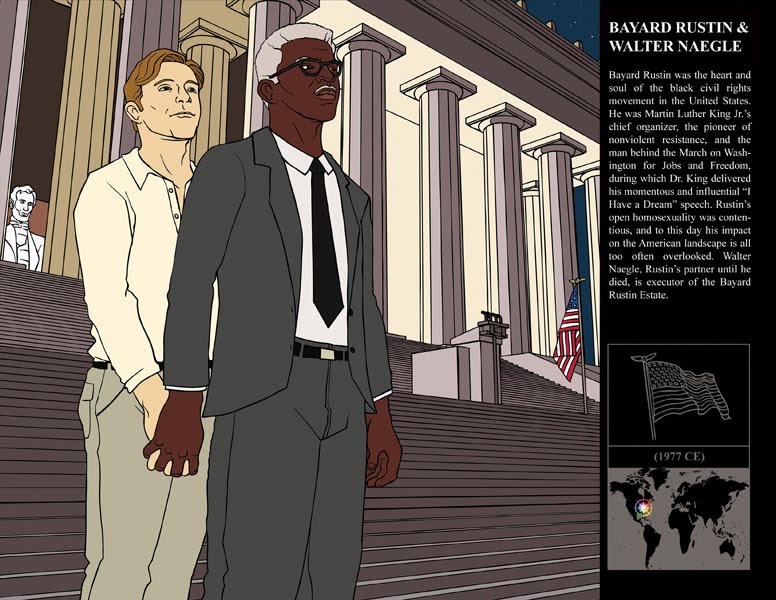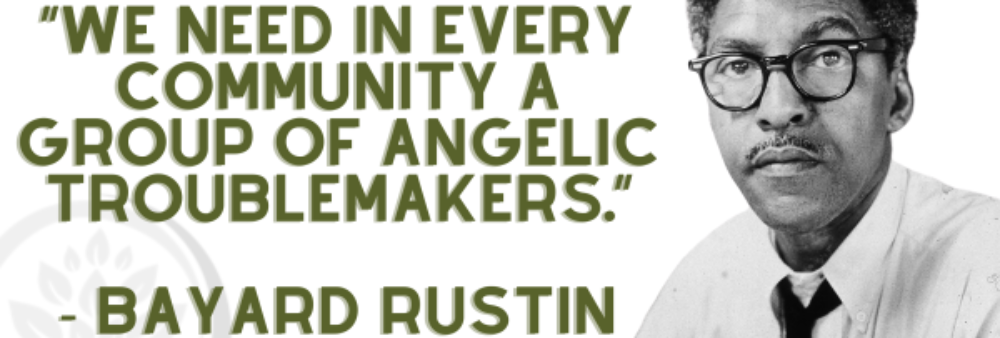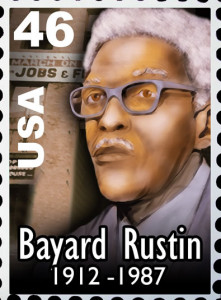Bayard Rustin  was the heart and soul of the Black Civil Rights Movement in the United States. He was Martin Luther King Jr’s chief organizer, pioneer of the movement’s nonviolent resistance, and the man behind the March on Washington for Jobs and Freedom, during which Dr. King delivered his momentous and influential “I have a Dream” speech.
was the heart and soul of the Black Civil Rights Movement in the United States. He was Martin Luther King Jr’s chief organizer, pioneer of the movement’s nonviolent resistance, and the man behind the March on Washington for Jobs and Freedom, during which Dr. King delivered his momentous and influential “I have a Dream” speech.
CALL TO ACTION: Celebrate the life and legacy of Bayard Rustin! Sign on to this letter urging the Citizens’ Stamp Advisory Committee to recommend a postage stamp in honor of Bayard Rustin.
Bayard Rustin’s open homosexuality was contentious, and to this day his impact on the American landscape is all too often overlooked and unknown. Bayard Rustin was born in 1912 in West Chester, Pennsylvania. Rustin began his impressive political career at an early age after an education at Wilberforce University, Cheyney State College and City College of New York (never received B.A.). Not only was he an integral part of the African-American civil rights movement, but became one of the leading advocates and examples for gay equality. Walter Naegle, Rustin’s life partner is the executor of the Bayard Rustin Estate.


Bayard Rustin’s dedicated work captured the attention of Dr. Martin Luther King Jr., who recruited Rustin as an assistant and colleague in 1956. Below is a streaming time line of affiliations and causes including those that led up to Rustin’s leading role in organizing the 1963 March on Washington, where Dr. King gave his iconic “I Have a Dream” speech.
- 1937 Rustin began his activist career by training at the American Friends Service Committee. Moved to Harlem and became organizer for the Youth Communist League (later to become anti-Communist).
- 1941 Quit Youth Communist League. Colleague of A. Philip Randolph, President of The Brotherhood of Sleeping Car Porters. Race Relations Secretary for the Fellowship of Reconciliation (FOR).
- 1942 Field Secretary for the Congress of Racial Equality (CORE) Colleague of Norman Thomas, a leader in the democratic socialist movement.
- 1945 Organized the Free India Committee, fighting for India’s independence from Britain.
- 1947 Helped plan the Journey of Reconciliation “freedom ride” which paved way for the freedom rides in the early 1960’s. After being arrested, Rustin’s experiences on a chain gang were chronicled on The New York Post which initiated an investigation that eliminated chain gangs in North Carolina.
- 1940’s Assisted in lobbying President Truman to eliminate segregation in the military.
- 1951 Organized the Committee to Support South African Resistance (American Committee on Africa).
- 1953 Joined the War Resisters League.
- 1956 Began assisting Dr. Martin Luther King, Jr. in the Montgomery Bus Boycott.
- 1957 Organized the Prayer Pilgrimage for Freedom.
- 1960’s Helped form the Recruitment and Training Program (R-T-P). Vice Chairman of the International Rescue Committee.
- 1963 Deputy Director and chief organizer of the March on Washington for Jobs and Freedom, where Dr. King presented the “I Have a Dream” speech.
- 1964 Helped found the A. Randolph Institute (APRI).
- 1972 Became co-chair of the Socialist Party of America Convention
- 1980 Participated in the March for Survival on the Thai-Cambodian border.
- 1982 Helped found the National Emergency Coalition for Haitian Rights. Chairman of the Executive committee of Freedom House.
- 1982 Due to the nonexistence of marriage equality, Rustin and Naegle took the then not unusual step to solidify their partnership and protect their union legally through adult adoption: in 1982 Rustin adopted Naegle, 30 years old at the time.
- 1983 Rustin’s report, “South Africa: Is Peaceful Change Possible?”, led to the formation of Project South.
- 1984 Rustin was arrested after participating in a “silent demonstration” in support of the pay equity demands of striking clerical workers at Yale University.
- 1987 In July 1987, Rustin became ill after returning from a mission to Haiti, where he had studied the prospects for democratic elections. Suffering from a perforated appendix that was tragically misdiagnosed, Rustin died a month later. He was 75.
- 2013 In August, President Obama chose civil rights leader Bayard Rustin to posthumously receive the Presidential Medal of Freedom. On November 23rd, Walter Naegle, Rustin’s life partner, accepted the Presidential Medal of Freedom on Rustin’s behalf from President Obama during a ceremony in the East Room of the White House.
The Bayard Rustin Coalition
is a registered 501(c)(3)
All donations are 100% tax deductible
Tax ID # 26-2879140

